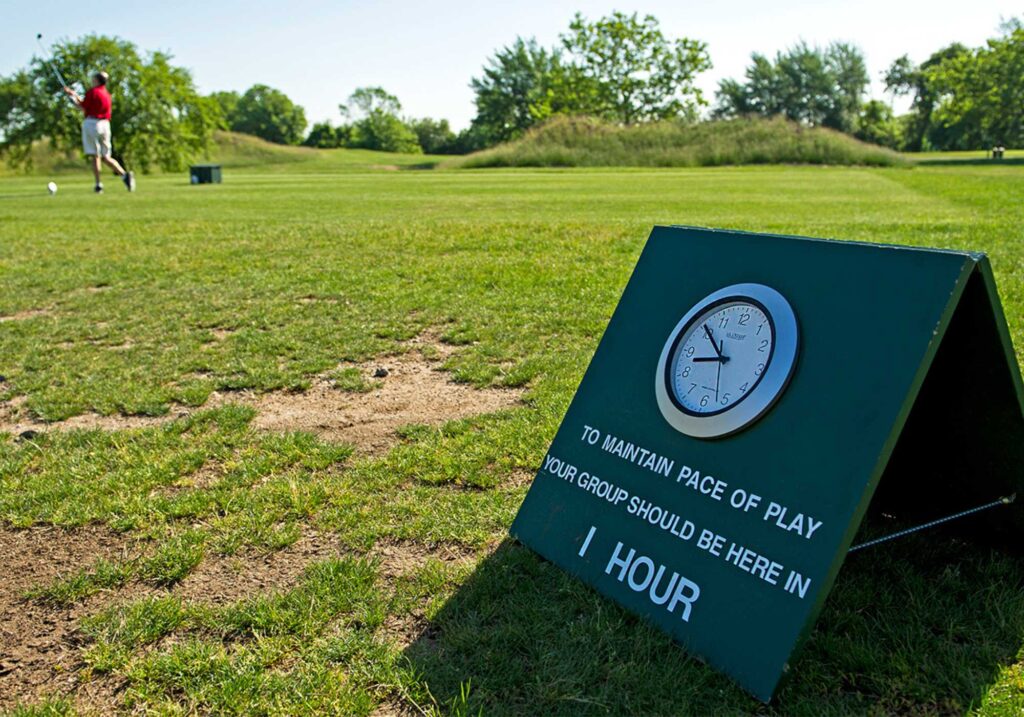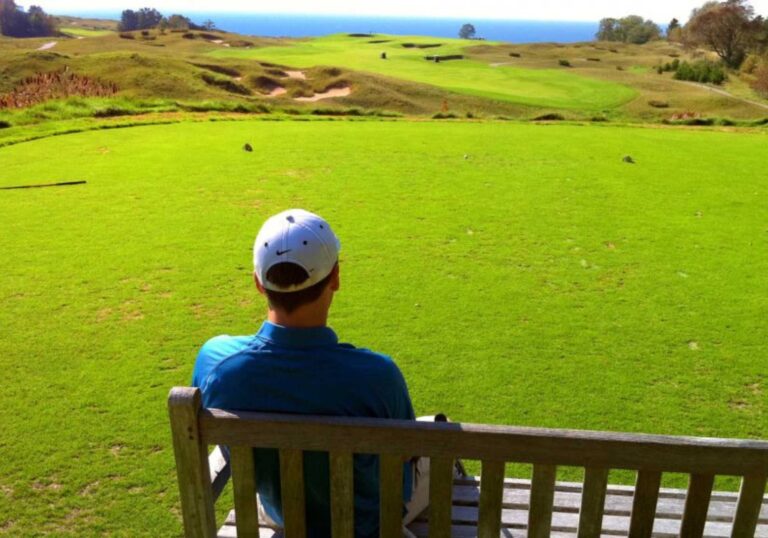If you’re new to golf, one of the first questions you’ll probably ask is: How long does a round of golf actually take? You’ve blocked out the afternoon, told your friends you’ll be back “sometime later,” but you’re not really sure what that means. Is it two hours? Five? Somewhere in between?
The honest answer is: it depends. But don’t worry, thankfully there are general guidelines and real-world factors that can help you understand what to expect and how to manage your time on the course.
Standard round length: 18 holes
Most full rounds of golf consist of 18 holes. On average, playing 18 holes with a foursome (four players) takes about four to four and a half hours.
This assumes a traditional course, average pace of play and players who are moderately experienced. If the course is busy or the group is new to the game, the round could stretch to five hours or more. Unfortunately.
If you’re playing alone or with one other person, the round can move much faster and sometimes under three hours if the course is open and you’re walking efficiently.
9 holes: The quicker option
A 9-hole round typically takes about two hours for a foursome and as little as one hour for a solo or twosome.
This is why many beginners, busy professionals, or after-work golfers choose to play just 9 holes. It’s a more manageable time commitment and still gives you plenty of swings, especially if you’re learning the game.
What factors affect how long a round takes?

There are several things that influence the actual pace of play, and most of them are outside your control. Here’s a breakdown:
1. Course traffic
If you’re playing during peak hours—weekend mornings or holiday afternoons—you’ll likely wait on many tees. A packed course can easily turn a four-hour round into a five-hour one.
2. Group size
A twosome will always move faster than a foursome. Solo golfers can zip around the course if allowed to play through, while large groups may naturally take longer.
3. Skill level
Newer golfers usually take more shots, more time to find balls and more time to make decisions. There’s nothing wrong with being new, but it does affect overall pace.
4. Walking vs riding
You’d think riding a cart would always be faster, but that’s not always true. If you’re zig-zagging across the course, spending time looking for balls, or waiting on the group ahead, a cart doesn’t save much.
Experienced walking golfers can sometimes finish faster than less organized riders.
5. Course difficulty and layout
Longer courses, hilly terrain, and tricky layouts with long walks between holes can slow down a round. Courses with water hazards, dense rough, or blind shots also add time.
How to speed up your round (without rushing your game)
Even if you’re a beginner, there are simple ways to keep pace and respect everyone’s time.
Be ready when it’s your turn
Have your club selected, glove on, and tee ready while others are hitting. No one expects perfect play, but being prepared helps the group move along.
Play “ready golf”
This means whoever is ready first hits, regardless of traditional order. It’s now widely accepted in casual play and even encouraged in some tournaments.
Limit lost ball searches
The rule allows three minutes to search for a lost ball. If it’s not easily findable, drop and move on. Keeping things moving is more important than saving one shot.
Keep practice swings to a minimum

One or two practice swings are fine. Five or six starts to slow everyone down.
Walk with purpose
Even if you’re not rushing, walk directly to your ball, make your plan, and keep moving. Small things like this add up over 18 holes.
Pick up when appropriate
If you’re learning the game and already at double par (for example, 8 on a par 4), it’s totally okay to pick up and move on. Keeping pace is more important than finishing every single hole, especially early on.
Sample time breakdown for 18 holes
Here’s how an average round adds up:
- Per hole: ~13 minutes per hole for a foursome
- 9 holes: ~2 hours to 2 hours 15 minutes
- 18 holes: ~4 to 4.5 hours
- Add time if you’re:
- Searching for balls
- Playing on a busy weekend
- Playing with slower groups
- New to the game and taking more shots
- Searching for balls
Walking vs riding: Is one faster?
- Riding a cart is generally faster if you’re sharing it with someone who plays at your pace and you both play from similar locations.
- Walking might take a little longer, but it’s often more consistent. No waiting for a cart partner or backtracking across the fairway.
In the end, neither method guarantees a faster round. It really comes down to how efficiently you move between shots and how crowded the course is. As well as general course layout as some courses are simply not walkable.
When is the best time to play a quick round?

If you want to avoid long rounds:
- Play early in the morning (first tee time is often fastest)
- Try twilight rounds where fewer people are on the course
- Midweek afternoons tend to be less crowded than weekends
- Play 9 holes instead of 18 if you’re short on time
Final thoughts
Most 18-hole rounds take around four to four and a half hours, but that can swing depending on where, when, and with whom you play. While you can’t control every factor, being prepared, playing ready golf, and managing expectations will help you enjoy your time out there.
If you’re new to the game and trying to fit golf into a busy schedule, don’t be afraid to start with 9 holes or seek out courses that cater to shorter, faster rounds.
Golf doesn’t have to take your whole day—it can fit your life, especially with a little planning.
Let’s hear from you
What’s the fastest or slowest round you’ve ever played? Do you prefer 9 or 18? Share your pace-of-play tips or course strategies below—we’d love to hear how you manage your time on the course.

